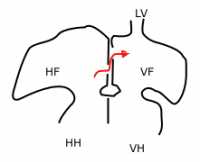
31 Oct Atrial Fibrillation after Percutaneous Foramen Ovale Closure
MedicalResearch.com Interview with:

Dr. Elgendy
Akram Elgendy MD
Division of Cardiovascular Medicine
University of Florida
MedicalResearch.com: What is the background for this study?
Response: Recent clinical trials have demonstrated that percutaneous patent foramen ovale closure is associated with lower risk of stroke recurrence in cryptogenic stroke patients. However, new-onset atrial fibrillation (AF) has been reported as a safety concern. To better understand the risk of new-onset AF, we performed a meta-analysis of PFO closure trials in patients with cryptogenic stroke and migraine.
MedicalResearch.com: What are the main findings?
Response:This study demonstrated that patent foramen ovale closure is associated with a four-fold increased risk of new-onset (3.2% vs 0.47%, p <0.001), however post closure atrial fibrillation occurs early (within 45 days post closure), is transient with no documented recurrence in 76% of the patients, and the incidence of stroke presumably related to device-associated AF is 0.1%.
MedicalResearch.com: What should readers take away from your report?
Response: Percutaneous patent foramen ovale closure is associated with increased risk of new-onset atrial fibrillation; however, the overall incidence of post closure atrial fibrillation is low, usually occurs early, transient with no documented recurrence, and rarely causes stroke.
MedicalResearch.com: What recommendations do you have for future research as a result of this work?
Response: Future research should focus on the underlying individual risk factors that might contribute to the development of atrial fibrillation post percutaneous PFO closure.
MedicalResearch.com: Is there anything else you would like to add?
Response: Our study demonstrated that the risk of new-onset AF is not increased with the use of the Amplatzer patent foramen ovale occluder.
Disclosures: Dr. Tobis has served as a consultant for St. Jude Medical and W.L. Gore; as a co-investigator of the RESPECT trial; on the Steering committee of the PREMIUM trial; and as a proctor for Cardiac Dimensions. Dr. Meier has received speaker fees from Abbott; and as a co-primary investigator of the PC and PRIMA trials. All other authors report no disclosures or conflicts of interest.
Citation:
Percutaneous PFO closure is associated with increased risk of new-onset atrial fibrillation; however, the overall incidence of post closure atrial fibrillation is low.
EuroIntervention Published on 16 October 2018
Akram Y Elgendy; Islam Y Elgendy; Mohammad K Mojadidi; Ahmed N Mahmoud; Julia S Barry; Hani Jneid; Siddharth A Wayangankar; Jonathan M Tobis; Bernhard Meier;
[wysija_form id=”3″]
[last-modified]
The information on MedicalResearch.com is provided for educational purposes only, and is in no way intended to diagnose, cure, or treat any medical or other condition. Always seek the advice of your physician or other qualified health and ask your doctor any questions you may have regarding a medical condition. In addition to all other limitations and disclaimers in this agreement, service provider and its third party providers disclaim any liability or loss in connection with the content provided on this website.
Last Updated on October 31, 2018 by Marie Benz MD FAAD
